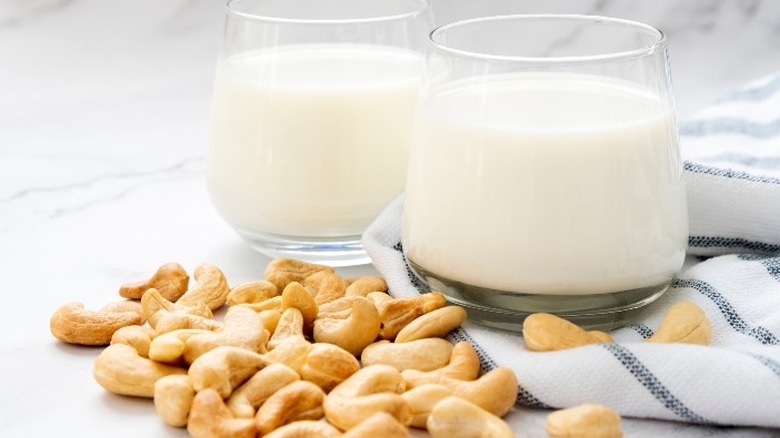Adopting a vegan lifestyle involves not only cutting out animal products but also finding nutritious and delicious alternatives to support a balanced diet. One of the most popular and beneficial substitutes is plant-based milk, which comes in a variety of options like almond, soy, oat, coconut, and rice milk. These dairy-free beverages provide numerous health benefits and are becoming essential staples in vegan and health-conscious diets.
In this guide, we’ll delve into the many health benefits of plant-based milk, helping you make an informed choice on your journey toward better nutrition.
What Is Plant-Based Milk?
Plant-based milk is made by extracting flavors, nutrients, and proteins from various plant sources. Commonly available in grocery stores and online, these milk alternatives are vegan-friendly, lactose-free, and often fortified with essential vitamins and minerals, making them a nutritious choice for anyone looking to reduce their dairy intake. From nut-based options like almond and cashew to grain-based varieties like oat and rice milk, there’s a plant-based milk to suit every taste preference and dietary need.
Top Health Benefits of Plant-Based Milk
1. Lactose-Free and Easy on Digestion
For those with lactose intolerance or dairy allergies, plant-based milk is a welcome alternative. It’s naturally free from lactose, making it easier to digest for individuals with sensitivity. Dairy milk can sometimes cause bloating and digestive discomfort, but plant-based milk options, like almond and oat milk, are gentle on the stomach and don’t contribute to these issues.
2. Low in Calories and Fat
Most plant-based milks, especially unsweetened varieties, contain fewer calories than regular cow’s milk. Almond milk, for example, typically has around 30-40 calories per cup, compared to 120 calories in whole milk. Many options, such as almond, cashew, and coconut milk, are naturally low in fat or contain healthy fats. This makes plant-based milk a great choice for those managing their weight or looking to maintain a balanced calorie intake.
3. Heart-Healthy Fats and Nutrients
Certain plant-based milks are high in heart-healthy fats. Almond milk, for instance, contains monounsaturated fats that are beneficial for heart health. Coconut milk, with its medium-chain triglycerides (MCTs), may aid in boosting energy and promoting healthy cholesterol levels. Replacing high-fat dairy products with low-fat plant-based options can be a positive change for cardiovascular health.
4. Rich in Vitamins and Minerals
Many plant-based milks are fortified with essential nutrients that contribute to overall health. Common fortifications include vitamin D, calcium, and vitamin B12. Calcium-fortified plant-based milk provides a dairy-free source of this important mineral, helping to maintain strong bones and teeth. Vitamin B12, which is usually found in animal products, is often added to support vegan diets, ensuring adequate intake for energy production and nerve health.
Popular Types of Plant-Based Milk and Their Unique Benefits
Different types of plant-based milk have their own unique nutritional profiles and benefits. Here are some of the most popular options:
1. Almond Milk
Made by blending almonds with water, almond milk is one of the most popular plant-based milk varieties. It’s low in calories and has a slightly nutty flavor that’s perfect for smoothies, coffee, and baking. Almond milk is rich in vitamin E, a powerful antioxidant that supports skin health, reduces inflammation, and helps protect cells from damage.
2. Soy Milk
Soy milk is known for its high protein content, making it a good dairy alternative for those looking to maintain muscle mass or increase their protein intake. It’s also rich in potassium, magnesium, and B vitamins. The protein content in soy milk is comparable to cow’s milk, providing approximately 7-8 grams of protein per cup. Additionally, soy milk contains isoflavones, which are associated with reduced cholesterol levels and may have heart-protective effects.
3. Oat Milk
Oat milk has a creamy texture and a mild, sweet flavor that pairs well with coffee and cereal. It’s high in fiber, particularly beta-glucan, a type of soluble fiber that supports heart health by lowering cholesterol levels. Oat milk is also a good source of iron and vitamin B vitamins, making it a nutritious choice for vegans.
4. Coconut Milk
Coconut milk has a tropical flavor and is a popular choice for making curries, smoothies, and desserts. It’s higher in calories than some other plant-based options due to its fat content, but these fats are primarily MCTs, which provide quick energy and may support weight management. Coconut milk also contains iron, magnesium, and potassium, making it a nourishing addition to many dishes.
5. Cashew Milk
Cashew milk is creamy, mild, and versatile, suitable for both savory and sweet recipes. It’s typically low in calories, especially in its unsweetened form, and provides heart-healthy monounsaturated fats. Cashew milk is a great source of magnesium, which plays a role in nerve function, blood pressure regulation, and muscle health.
Environmental Impact of Choosing Plant-Based Milk
Switching to plant-based milk also benefits the environment. Producing plant-based milk generally requires less water, land, and energy compared to traditional dairy farming. For example, almond milk uses a fraction of the water needed to produce cow’s milk, and oat milk has a lower carbon footprint than dairy. By choosing plant-based milk, you can reduce your carbon footprint and contribute to a more sustainable food system.
Incorporating Plant-Based Milk into Your Diet
Integrating plant-based milk into your daily routine is easy and versatile. Here are some delicious and practical ways to enjoy it:
- Smoothies: Use almond or oat milk as a base for fruit smoothies for a nutrient-packed breakfast or snack.
- Coffee and Tea: Add coconut milk or oat milk to your coffee for a creamy, non-dairy latte.
- Baking: Substitute plant-based milk for dairy milk in cakes, muffins, and pancakes to make them vegan-friendly.
- Cereal and Oatmeal: Top your cereal or mix into oatmeal with soy or almond milk for a protein and vitamin boost.
Conclusion
Plant-based milk offers a delicious and nutritious alternative to traditional dairy, with a variety of options to suit different tastes and dietary needs. From heart-healthy fats to essential vitamins and minerals, plant-based milk can provide valuable health benefits for those following vegan products, lactose-free, or health-conscious lifestyles. Switching to plant-based milk not only supports personal wellness but also contributes positively to environmental sustainability. So, whether you’re looking to reduce your dairy intake, embrace veganism, or try something new, plant-based milk can be a flavorful and nutritious choice for everyone.








